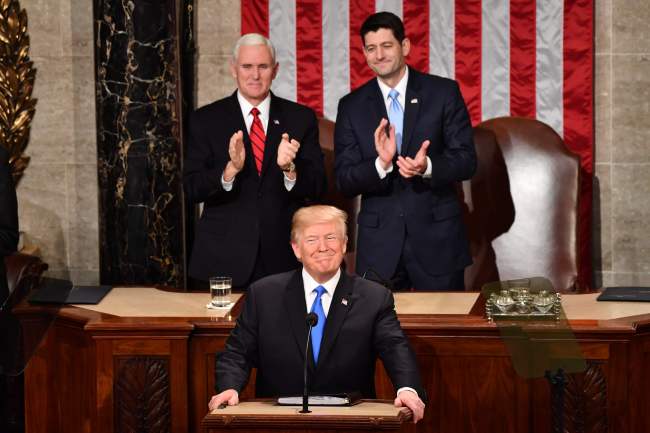US President Donald Trump reiterated his administration’s “campaign of maximum pressure” on North Korea, casting doubt on the prospects of further talks after the PyeongChang Olympics.
On matters regarding North Korea, Trump used his first State of the Union address Wednesday to highlight the growing threat posed by North Korea and highlighted the brutal nature of the regime.
“No regime has oppressed its own citizens more totally or brutally than the cruel dictatorship of North Korea,” Trump said.
“North Korea’s reckless pursuit of nuclear missiles could very soon threaten our homeland. We are waging a campaign of maximum pressure to prevent that from ever happening.”
While Trump stayed away from taunts directed at North Korean leader Kim Jong-un, the US leader made it clear that his administration would not back down on the issue.
“Past experience has taught us that complacency and concessions only invite aggression and provocation. I will not repeat the mistakes of the past administrations that got us into this dangerous position,” Trump said.
 |
| US President Donald Trump gives his State of the Union address on Wednesday, and Vice President Mike Pence and Speaker of the House of Representatives Paul Ryan clap in the background. Yonhap |
Although Trump’s words were milder than those he previously used on North Korea, experts say that his message is clear.
Wednesday’s address “indicates that current policies will be maintained,” said Kim Hyun-wook, a professor at the Korea National Diplomatic Academy.
“(The speech) was toned down, but the fact that Warmbier and human rights issues were mentioned reflects negative views on North Korea,” said Kim.
In the address, Trump detailed the detainment and eventual death of American university student Otto Warmbier, and the ordeals of North Korean defector Ji Seong-ho who escaped from the North in 1996. During his time in the North, Ji was involved in an accident that resulted in amputations, and was tortured by the authorities.
Describing Ji’s story as a “testament to the yearning in every human soul to live in freedom,” Trump said that the US was founded on the values of freedom, and that the US has defended such values throughout its history.
Kim added that the tone of the speech was similar to that of Trump’s address to the South Korean National Assembly in November. At the time, Trump highlighted North Korea’s human rights violations, describing the country as “a hell that no person deserves.”
Others observers interpreted Trump’s address as a “grave message.”
“The message is that (the North Korean) regime is not one that can co-exist with the values the US has defended since the country’s foundation,” said Cha Du-hyeogn, a visiting research fellow at the Asan Institute for Policy Studies.
He added that Trump’s descriptions of North Korea’s human rights violations before stressing the value the US places on freedom is a clear message.
“This is very serious (message). This implies that US-North Korea dialogue, denuclearization talks will be difficult and should not be hoped for.”
Such assessment bodes ill for Seoul’s hopes for the current inter-Korean talks to lead to a US-Pyongyang dialogue.
President Moon Jae-in and his aides have referred to North Korea’s participation in the PyeongChang Olympics as a “primer for peace,” and as laying the groundwork for US-North Korea dialogue.
Trump administration officials, for their part, have shown no signs that they consider such an outcome possible.
A White House official was recently quoted as saying that related developments were a “charade,” while top US officials have repeatedly stated dialogue is only possible if Pyongyang shows credible evidence of being ready to discuss denuclearization.
According to Konyang University professor emeritus Kim Tae-woo, former head of the Korea Institute for National Unification, while a number of possibilities exist for North Korea after the PyeongChang Games, one that facilitates Washington-Pyongyang talks is unlikely.
“One possibility is that North Korea abandons its nuclear program but that is unlikely. Another is that North Korea stays on the same path,” Kim said.
“Third is that North Korea embarks on even more provocations, which would enrage Washington and lead to a bigger standoff.”
By He-suk Choi and Jun-suk Yeo
(Korea Herald)

